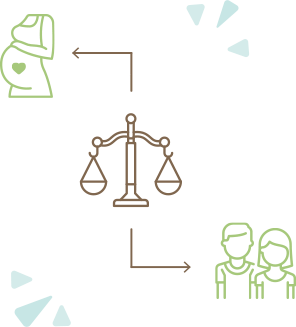how much does Adoption Cost?A Breakdown of Adoption Fees
Brittany, Shana, and LifeLongBabies Brixton and Beau
Private Domestic Adoption Costs
The cost of a private domestic adoption depends on a number of factors: the adoption professionals and service providers you work with, the circumstances of the birthmother and child involved, how much birthmother financial support is permitted by state law, how much travel is required, and more. Below we’ve outlined what you can typically expect as far as adoption costs. Remember, every adoption is different and what each family spends on their adoption varies greatly from situation to situation. As such, there is no single number that adoptive parents can plan on. Despite the average cost of adoption in the US varying greatly, many prospective families find the journey rewarding, and there are opportunities along the way that can help offset expenses.

The Adoption Home Study
In order to legally adopt a baby in the United States, a family must have a completed adoption home study conducted by a licensed social worker. This usually takes three to four months and includes a background check and a thorough examination of your home, finances, family, relationships, reasons for adopting, and more. The cost of a home study is set by the individual social worker or the agency, but it generally costs somewhere between $1,500 – $3,000. These fees are paid directly to the social worker or agency.

Marketing & Advertising
If you are working with an adoption service provider whose program includes marketing and advertising, this is typically part of their program fee. These fees typically cover online and offline marketing and advertising in order to reach potential birthmothers. Many service providers also create an adoptive family profile for each family that allows them to be presented to expectant mothers. The cost of designing and printing this profile is usually part of this adoption fee. This fee may also include networking with professionals across the country who work with expectant mothers, including attorneys, agencies, social workers, doctors and hospitals, pregnancy and crisis shelters, and more. While not every service provider offers marketing and advertising services, many adoptive parents consider these costs an essential component of a successful adoption.
Legal Services
Legal services come into play when an expectant mother decides to move forward with a specific adoptive family. As part of her adoption plan, every expectant mother needs a dedicated adoption attorney hired for her. Depending on state laws, the adoptive family might need their own adoption attorney as well. The cost of adoption legal services is determined by the individual legal professional, but legal services generally cost in the range of $5,000 – $9,000. All legal services for the birth parents and the adoptive family are paid for by the adoptive family, and those adoption fees are paid directly to the attorney.

Birthmother Expenses
As part of her adoption plan, every expectant mother is entitled to a certain amount of financial assistance from the adoptive family. Financial assistance can only be provided after legal services are hired and must go through the adoption attorney. Usually, financial assistance can be provided for rent, utilities, bills, maternity clothes, food, transportation, counseling, and more. The amount of financial assistance allowed and what specifically can be covered is determined by state law. Because laws can vary drastically from state to state, it’s difficult to predict how much a family will spend on birthmother expenses. To give a general idea, a family can expect to pay between $5,000 and $10,000.

Travel Expenses
Travel expenses are adoption costs associated with adoption-related travel, typically involving airfare and/or ground transportation, lodging, food, and more. The adoptive family will need to travel to meet their baby after the birth, and they also may need to travel to meet the birth parents before placement. Once the baby is born, the adoptive family must stay in the birthmother’s state for a number of days while the adoption paperwork is handled.
Raising Your Adopted Newborn
As prospective parents near the end of their journey, the cost of the adoption process is just the beginning. Raising a child can be expensive, and adoptive parents should plan to have an emergency fund available that can cover three to six months' worth of expenses. They should consider the cost of adding another member to the family and all of the food, housing, clothing, and other expenses that doing so involves.
Covering Adoption Costs
The average cost of adoption in the US varies greatly, and there is no singular number that potential adoptive parents can anticipate. To help cover a wide range of adoption costs, prospective parents can find financing through adoption loans. These loans can provide peace of mind and cover many of the adoption fees and expenses that come up throughout a family’s adoption journey. They also offer a more affordable way of covering larger expenses and fees on a month-to-month basis, as opposed to coming up with vast sums of money all at once.
The Adoption Tax Credit
If you’re considering the question, “How much does adoption cost,” it’s easy to get bogged down in the details surrounding typical adoption expenses. There are also certain types of financial assistance to make adoption more affordable, like the Adoption Tax Credit.
The Adoption Tax Credit is a set amount of money that can be deducted directly from the taxes that are owed. Unlike a tax deduction, with a tax credit, a family can get reimbursed dollar for dollar, provided they qualify for the credit. To qualify, adoptive parents must have had a domestic, non-special needs adoption during the tax year. Even if an adoption doesn’t finalize, it’s likely that adoption fees and expenses were paid, meaning that adoptive parents can still take the credit. It’s important to obtain and save receipts for all eligible adoption-related expenses, including adoption program fees, attorney fees, agency fees, travel expenses, etc.
The amount of the Adoption Tax Credit changes at least once a year. Click here for more details and to see the current amount.
For more information about the Adoption Tax Credit, please consult with a tax professional.Frequently Asked Questions
The Adoption Tax Credit
The Adoption Tax Credit is a federal tax relief mechanism for adoptive families. It's specifically designed to alleviate the financial burden associated with adopting a child by offering a significant offset for qualifying adoption-related costs. The credit helps make the adoption process more accessible and less financially daunting for families.
Unlike a tax deduction, which reduces the amount of income on which you are taxed, the Adoption Tax Credit allows for a direct deduction from your overall tax liability, offering a dollar-for-dollar reimbursement. For every dollar of qualifying adoption expenses, there's a corresponding reduction in the taxes you owe. If the credit exceeds your tax liability for the year, the excess may be carried forward for up to five years.
The Adoption Tax Credit covers a wide variety of adoption costs, including court costs, attorney fees, adoption-related travel expenses, agency fees, birth parent financial support, among others. To get the most out of the credit, it's important for adoptive parents to meticulously collect and save receipts for all adoption fees and expenses incurred during their journey; these will be needed to claim the credit when filing their federal tax return.
The exact amount of the Adoption Tax Credit changes annually due to inflation, cost of living adjustments, and other economic factors. As a result, the credit amount varies each year. For the most current and accurate information, consult with a tax professional.
In the event that an adoption attempt is unsuccessful, adoptive parents may still be eligible to claim the Adoption Tax Credit, provided they meet the other necessary qualifications. It's important for families to understand the requirements for claiming the credit under these circumstances and to consult with a tax professional for advice specific to their particular situation.
Adoptive families may be able to claim the Adoption Tax Credit for multiple adoption opportunities they pursued during the previous year, even if an adoptions did not finalize. Families must meet specific IRS requirements should consult with a tax professional to ensure they understand the eligibility criteria and properly claim the credit for each adoption attempt.
Cost of Adoption
Several factors contribute to the high cost of domestic newborn adoption. The adoption fees required to work with an agency, service provider, and/or other adoption professional cover a range of specialty services, including marketing, counseling, administrative costs, and more. Furthermore, after connecting with an expectant mother, adoptive parents usually cover expenses related to the birthmother's pregnancy, delivery, and post-placement support. Legal expenses can also be significant adoption costs, including court fees and expenses associated with securing the necessary legal documentation. Additionally, some adoptive families need to cover travel expenses for interstate adoptions or to meet with the birthmother.
Adoption agencies and service providers have varied strategies they employ in an attempt to keep the total cost of an adoption within a family's predetermined budget, but unpredictable expenses are highly likely to arise. If a birthmother situation exceeds a family’s budget, adoptive parents have the option to decline that opportunity to minimize additional adoption costs. however, many families pursue the opportunity anyway and find other ways to meet the new financial requirements.
Specific expenses directly related to a connection with an expectant mother, such as birthmother expenses, medical costs, and certain legal fee, may not be refundable. Each adoption agency or adoption attorney has its own policies regarding these funds, so it is important to review and understand these policies before entering into a connection.
Yes, financial aid and subsidies may be available to help offset the cost of adoption, such as federal and state adoption tax credits, grants from nonprofit organizations, private loans, and employer-provided adoption benefits.
Conclusion
How expensive is adoption? The short answer is that it depends on a number of factors, including but not limited to the type of adoption, specific marketing or advertising fees, home study fees, agency fees, where the expectant mother lives, state laws, adoption attorney fees, other adoption professionals hired, birthmother expenses, and more. If that list of potential adoption costs sounds intimidating, remember that the road to adoption is long, yet rewarding. For those who have grown their families through infant adoption, there is no price tag on all of the memories, special moments, and experiences each family has been able to create — together.


